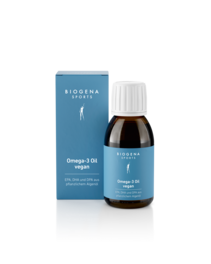Omega-3 fatty acids could be a game-changer for athletes looking to naturally enhance their performance. This essential guide explains the benefits of omega-3s for athletes, how much to take, and when.
About omega-3 fatty acids and why they are important for athletes
Omega-3 fatty acids are essential fatty acids that the human body cannot produce itself. They play a very special role for athletes:
Top 7 benefits of omega-3 for athletes
- Reducing muscle soreness: Omega-3 can help minimize post-workout pain.
- Faster recovery: Its anti-inflammatory properties can shorten recovery time.
- Improved muscle building: Studies suggest that omega-3 can support muscle protein synthesis.
- Joint protection: Omega-3 can help relieve joint pain and reduce osteoarthritis symptoms.
- Strengthening heart health: A healthy heart is the basis for physical performance.
- Boost for the immune system: Potential reduction in illness-related downtime.
- Increase in cognitive performance: Possible improvement in concentration and reaction time in competition.
How exactly do omega-3 fatty acids work in the body of athletes?
Exercise, especially intense training, causes microscopic injuries in the muscles and triggers inflammatory processes in the body. These inflammations are a natural part of the regeneration process that makes the body stronger and more powerful. However, excessive inflammatory reactions can negatively affect regeneration and performance.
This is exactly where omega-3 fatty acids come into play: due to their anti-inflammatory properties, the above-mentioned benefits such as accelerated regeneration, reduced muscle soreness and improved performance can be achieved.
Studies & research: scientific findings on omega-3 in sports
Numerous studies have shown the positive effects of omega-3 fatty acids for athletes.
For example, a study with British soccer players showed that taking omega-3 after training reduced muscle soreness and inflammatory markers in the blood.
Another study showed, as already mentioned, that taking omega-3 for eight weeks led to increased muscle protein synthesis, suggesting a positive effect on muscle building.
Omega-3 requirements for athletes: how much omega-3 is necessary?
The optimal dosage depends on the individual training level. While the general recommendation is 250 mg of EPA and DHA per day, a higher intake is recommended for athletes:
Hobby athletes: 1-2 grams of EPA and DHA per day
Competitive athletes: 2-4 grams of EPA and DHA per day
Important: These figures are intended as a guide only. For an individual dosage, we recommend consulting a sports nutritionist or a medical professional.
Omega-3 sources for athletes
Oily fish such as salmon, mackerel, herring and tuna are the best sources of EPA and DHA. However, eating large quantities of fish is not recommended for everyone for reasons of sustainability and due to the heavy metal contamination.
Therefore, taking high-quality omega-3 dietary supplements can be useful to meet your needs. When choosing supplements, you should look for high quality and purity. If you prefer vegetable omega-3, you can also find omega-3 supplements based on algae.
Microalgae are the original producers of the omega-3 fatty acids DHA and EPA. Fish only obtain their omega-3 fatty acids by eating these algae. An oil made from microalgae such as Schizochytrium sp. is therefore particularly suitable for vegetarians, vegans or people who do not want to eat fish.
Take omega 3 before or after exercise?
Taking omega-3 can be useful both before and after exercise. Taking it before exercise can help to prevent muscle soreness, while taking it after exercise can support recovery.
The full effect often only develops after a few weeks of regular intake. Therefore, long-term use should be considered.
Conclusion: Omega-3 as a natural performance enhancer in sports
Omega-3 fatty acids are more than just a trend – they can be an essential building block for optimal performance in athletes. From supporting recovery to potentially improving mental fitness, they offer a wide range of benefits for athletes at all levels.
It is important to note that omega-3 is not a miracle cure, but should be part of a total nutritional strategy. Combining it with a balanced exercise and adequate rest program can lead to optimal results.
**Please note: This article is for informational purposes only and is not meant to replace medical advice. A doctor or qualified nutritionist should be consulted before making any significant changes in diet or supplementation.
Sources:
https://pubmed.ncbi.nlm.nih.gov/30591639/
https://pubmed.ncbi.nlm.nih.gov/33266318/
https://pubmed.ncbi.nlm.nih.gov/26610527/
https://pubmed.ncbi.nlm.nih.gov/38804457/
https://pubmed.ncbi.nlm.nih.gov/33441158/
https://pubmed.ncbi.nlm.nih.gov/30484702/









